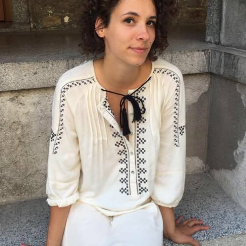While the fight for gender equality is far from over, in many ways 2017 felt like the start of a reckoning. Although the year started with the inauguration of President Trump, the next day saw over three million women march in over 300 US cities in protest.
Then, in October, the Harvey Weinstein allegations shone a light on the sexual assault and misconduct suffered by millions of women, not just in Hollywood but in politics, the music industry, the media, the Silicon Valley and the sciences too.
The flood of #MeToo declarations on social media since then has brought open secrets into the spotlight and forced several uncomfortable conversations about sexism within society. This push for change has also proved inspirational, with a record-breaking number of women choosing to run for political office in the US this year.
447 women are intending to run for office in the US Senate and the House of Representatives, according to new data from the Center for American Women and Politics at Rutgers University - more than twice the number of female nominees in 2016.
There may still be a long way to go before the boys’ club atmosphere in US politics, locker room talk and all, is gone completely, but the pessimism of early 2017 has given way to a determination that seems set to change the political landscape for good.
The power of #MeToo
When the first stories of sexism, sexual harassment and sexual assault or rape started to be shared on social media as part of the #MeToo movement, few of those involved likely expected their words to inspire real political change.
However, for the current generation of female college students and activists, #MeToo was a call to arms, and an example of how social media can be used to organize disparate voices into a movement.
“#MeToo is absolutely something that I’ve seen directly inspire college women to get involved in politics”, says Jenna McGreevy, Communications Director for Pennsylvania College Democrats. “It’s helped women realize that there aren’t equal levels of representation for women in the United States. We’re actually much far behind other developed nations in terms of the percentage of women we have working in all levels of government.”
Jenna has seen this political awakening reflected in the new generation of college women getting involved by joining the College Democrats’ women’s caucuses and taking up student leadership positions.
Crucial to these efforts to increase awareness and representation is social media. As with #MeToo, sites like Facebook and Twitter have been vital tools for Jenna and others to organize students, particularly when it comes to elections.
“So many events happen within 24 hours’ notice, and special elections are sometimes confusing to people. They’re not sure they’re in the right district to vote or they may not even know that a special election is happening. Social media sites like Facebook or Twitter are a good way to spread the word and make sure people are registered to vote.”
Jenna is hopeful that this increased interest in politics from college women and signs of increased female representation in politics will be beneficial for democracy in more ways than one.
Citing a 2017 study, she says: “Female politicians are more collaborative and work on more bipartisan efforts, but they also tend to be less extreme in terms of what their actual ideological goals are. They’re less likely to vote on a bill that has a really negative top outcome for women or that’s super anti-environment, for example.”
The Trump effect
Of course, it’s not just #MeToo that’s responsible for this rise in political engagement among young women. A Politico survey of 2,000 people suggests the election of Donald Trump as US president sparked interest in what’s happening in politics, particularly among Democrats and women.
Unimpressed with the current commander-in-chief (Trump’s approval rating with women is a dismal 33 percent, according to a February 2018 poll), women have clearly decided to fix the problem themselves. Politico has even labelled this the “Trump effect”, saying: “Democrats – especially women – hold very negative feelings for Trump, and those feelings have indeed generated more political interest and activity.”
While the survey conducted in May last year noted that heightened interest in politics was in most cases not sufficient to convince women to run for office, it discovered that a small fraction of women, 28 percent, had considered running for office for the first time in the last six months.
The survey also discovered that organizations recruiting women to work on campaigns or run for office have seen a surge of interest, particularly from female Democrats.
One of these organizations is Running Start, a non-profit focused on providing high school and college women with the contacts, skills and confidence they need to run for office. Jessica Kelly, programs and leadership director at the organization, said: “Research here in the US shows that it’s around high school and college that the ambition drops off, particularly for women.
“[There is] a big disparity in the encouragement young girls get from everyone in their lives - parents, teachers, coaches, other authority figures - and we’re trying to be that voice, to step in and to say: ‘Yes, you have a place in politics. Here are some of the skills you’ll need to help build that confidence to pursue it.’”
As well as teaching young women the skills and confidence needed to run for office, organizations like Running Start also provide an invaluable support network for those entering the male-dominated environment of politics.
As the #MeToo movement showed, this ability to share stories publicly and find support easily is key, especially as stories of sexual misconduct and harassment at the upper echelons of government have made the headlines multiple times recently.
“If you don’t feel that you have anyone that you trust, call us at Running Start, and we’ll be those people for you,” says Jessica. “You definitely do not have to be in a position that makes you uncomfortable. You deserve to be in the room. Whether that’s at a job, an internship, or running for office, you deserve to be there and should not be made to feel uncomfortable.”
Thinking of getting involved?
It may be a long way from the White House, but it’s entirely possible the future leaders of America are young women currently studying somewhere in the US who are about to enter the world of politics for the very first time.
For Maggie Kautz, a student in optical sciences and engineering at the University of Arizona, that entrance into politics came after reading about a bipartisan student club called No Labels in the school newspaper.
At one of their sessions, she met members of the University of Arizona Young Democrats, an organization she is now president of. “I went to a Young Dems meeting and I got to meet the people involved and make some friends. We went to a luncheon for Planned Parenthood in the first couple of weeks I’d joined the club and we went up to Flagstaff to canvas for Ann Kirkpatrick who was running for senate at the time.”
These initial experiences of the world of politics inspired Maggie to get even more involved, and she’s currently working on a voter registration campaign on campus ahead of the 2018 midterm elections.
2018 will be particularly interesting year for Arizona politics. Republican Rep. Trent Franks’ seat will be up for grabs in April after he resigned following allegations of sexual harassment, and the two women hoping to turn his seat blue are physician Hiral Tipirneni (D) and transgender activist Brianna Westbrook (D), who received Chelsea Manning’s official endorsement.
Maggie says she’s cautiously confident of a positive outcome. “Women have a really good shot at taking senate seats and house seats in Arizona. Arizona almost went blue during the 2016 elections, and Hillary actually won Pima County where the University of Arizona Young Dems are working.”
Of course, Arizona isn’t the only place with an important election this year (you can find a handy rundown of key 2018 election dates here, courtesy of the New York Times). Wherever you’re studying and whichever party you support, your efforts could make the difference and, as Maggie’s story shows, it’s really easy to get started.
If you want to learn more about Running Start, click here. Find College Democrat chapters in your area by clicking here.








